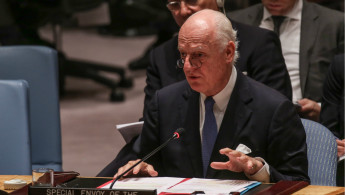Syria's rebels reveal doubts over UN peace plan
The statement, of which al-Araby al-Jadeed has received a copy, said: "The revolutionary fighting factions have met to discuss the Security Council's presidential statement issued on 17/8/2015 and the plan submitted by UN Special Envoy to Syria Staffan De Mistura, and support the statement of the Security Council in its bid to prepare a favourable environment to initiate substantive political negotiations, and confidence-building between the parties."
The statement, which contained 12 points, welcomed the "call to launch a political process that would lead to political transition in accordance to the Geneva Communique, which calls for establishing a transitional governing body to take over immediately after an agreement is reached, exercising full executive powers including the powers of the president".
The statement called for the departure of Syrian President Bashar al-Assad and the pillars of his regime as a condition for agreeing to start the political process, saying none must have a role in "the new Syria".
The statement called for implementing resolution 2139, which calls on all parties to refrain from attacking civilians and use weapons indiscriminately in inhabited areas, including indiscriminate shelling and barrel bombs. The resolution also calls for an end to arbitrary detention, torture and kidnapping and for the immediate release of detainees.
The signatories criticised the omission of "terrorist groups" invited into Syria and assisted by Damascus.
These groups are engaged in genocide, forced displacement and ethnic cleansing in Syria, the armed groups alleged.
Their statement cited sectarian militias including the Iranian Revolutionary Guards and Lebanese Hizballah, calling for these groups to be included on the list of terrorist organisations.
The statement also called for excluding Iran from consultations on Syria, saying Iran was implicated in Syrian bloodletting, backed "terrorist militias" and promoted sectarian strife among Syrian communities.
The statement also recalled that Iran rejected the Geneva Communique as a reference framework for the political process, despite its endorsement by Security Council resolution 2118.
| We call on the UN envoy to immediately start implementing the Geneva Communique - Statement by Syrian opposition factions |
The signatories then stressed the need for the state's institutions to continue functioning and providing services - but said they rejected the continuation of the army and security services, which they said must be dismantled or restructured, along with the judiciary.
The statement called for respecting the will of the Syrian people, "who alone have the right to lay the foundations of the future constitution" and for not imposing in advance principles that confiscate the people's will".
"We call on the UN envoy to immediately start implementing the Geneva Communique with regional and international guarantees, without resorting to prior procedures and committees that would take long periods of time that would result in depriving the Geneva Communique of its content."
The statement also stressed "the need for real guarantees that oblige all parties to implement what was agreed upon, as the Syrian regime has become used to non-compliance with resolutions in the past five years".
The statement continues: "The blatant Russian intervention on Syrian territories undermines the efforts of a political solution". It concludes by demanding the UN Security Council "shoulder its responsibilities towards the Syrian tragedy and work on implementing the relevant resolutions in the interest of the Syrian people".
Wael Alwan, of the Islamic Union of the Soldiers of the Levant - one of the signatories - said the statement was "issued after consecutive meetings of the factions in order to come out with a rigorous political wording around the plan by the UN Envoy to Syria Staffan De Mistura, which has missed out what came out of Geneva I and Geneva II and left the fate of Assad vague, which is something that we completely reject".
Alwan told al-Araby that De Mistura's plan was "not serious, and its details were not clear".


![Minnesota Tim Walz is working to court Muslim voters. [Getty]](/sites/default/files/styles/image_684x385/public/2169747529.jpeg?h=a5f2f23a&itok=b63Wif2V)






